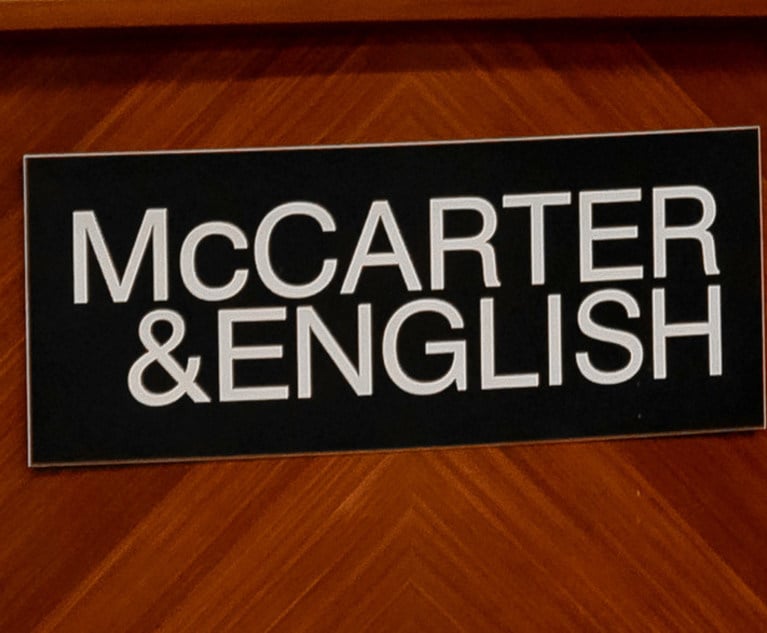 Credit: bxtr/Adobe Stock
Credit: bxtr/Adobe StockAppellate Division Greenlights State Bar's Leadership Diversity Initiatives
“This case not only vindicates affirmative action in New Jersey but also stands for the proposition that freedom of association is a basis for doing good things, like affirmative action, and not just the kind of troubling and invidious discrimination, as was allowed in [Boy Scouts of America v.] Dale,” Lawrence Lustberg of Gibbons said.
December 23, 2024 at 03:52 PM
5 minute read
The New Jersey State Bar Association's leadership diversity initiatives are constitutional under the First Amendment right to expressive association, the Appellate Division has ruled.
The decision, issued Dec. 20, marks a win for the bar association, as the ruling overturns a 2022 decision in favor of a Muslim lawyer who had sued the organization, challenging its system of allocating certain leadership positions, including seats on the board of trustees, to members of underrepresented groups.
The three-judge panel's unanimous ruling reversed the trial court’s decision, which held that the bar association’s method of filling at-large seats was a violation of the state's Law Against Discrimination (LAD). Judge Allison E. Accurso, who authored the opinion for the court, said that compelling the NJSBA to comply with the LAD would violate the group’s First Amendment right to expressive association.
“The bar association's decades-long commitment to diversifying its leadership, as established in the record, leaves no doubt about the sincerity of its commitment,” wrote for the court. “The association maintains that forcing it to end its long-standing practice for filling at-large seats runs ‘the risk, borne out by history,’ that ‘underrepresented groups will not be guaranteed a seat at the table.’”
The plaintiff in the case, Rajeh A. Saadeh, had filed suit against the bar in Middlesex County Superior Court, claiming the association discriminated against him by setting aside at-large seats on its board, nominating committee, and the Judicial and Prosecutorial Appointments Committee for individuals from historically underrepresented groups.
Saadeh, a current member and past president of the New Jersey Muslim Lawyers Association, describes himself as a Palestinian Muslim American, according to the opinion. In his November 2021 complaint, Saadeh alleged claims of unlawful discrimination and violation of his civil rights. He sought compensatory and punitive damages and an injunction restraining the state bar from current and future violations of the LAD, among other claims.
The state bar argued that under the U.S. Supreme Court’s decision in Boy Scouts of America v. Dale, they are entitled to their First Amendment right to expressive association by selecting their leaders in a way consistent with their values. Saadeh countered that stopping the state bar from discriminating does not infringe on that right. Amicus briefs from several affinity bars, including the Asian Pacific American Lawyers Association of New Jersey, the Garden State Bar Association, and the Hispanic Bar Association of New Jersey, among others, supported the state bar’s position.
In Dale, the U.S. Supreme Court overturned a New Jersey Supreme Court decision that held that the Boy Scouts is a place of public accommodation and that the organization’s policy of excluding openly gay members was a violation of the LAD. The U.S. Supreme Court held that the Boy Scouts were entitled to the First Amendment right to expressive association.
“Applying Dale to the undisputed facts in this record establishes beyond peradventure that the bar association qualifies as an expressive association, and that compelling it to end its practice of ensuring the presence of designated underrepresented groups in its leadership would unconstitutionally infringe its ability to advocate the value of diversity and inclusivity in the association and more broadly in the legal profession,” Accurso concluded.
Accurso also noted that the trial judge in this case was the first in New Jersey to address the issue of affirmative action programs involving private, not-for-profit associations such as the state bar.
Accurso added that, while attorneys have been looking to the case to squarely resolve whether a private nonprofit organization's affirmative action program violates the LAD, that question will have to wait for another case since Saadeh's case was resolved on constitutional grounds.
She was joined in her opinion by Judge Katie A. Gummer and Judge Kay Walcott-Henderson.
Lawrence S. Lustberg of Gibbons represented the state bar on appeal. In a statement emailed to the Law Journal, Lustberg said it was an honor to participate in what he called “a landmark case.”
“This case not only vindicates affirmative action in New Jersey but also stands for the proposition that freedom of association is a basis for doing good things, like affirmative action, and not just the kind of troubling and invidious discrimination, as was allowed in Dale,” Lustberg said. “The Appellate Division’s decision is a careful, fair and outstanding one, that will, I am sure, stand up to further review if that is required.”
In a statement to the Law Journal, counsel to Saadeh, Lindsay A. McKillop of the Law Office of Rajeh A. Saadeh, said in an email to the Law Journal said the ruling allows the NJSBA to discriminate against protected categories "because its scheme furthers its stated views on diversity."
"Under such logic, restaurants are again allowed to only serve white people or designate 'white only' tables—and employers are again allowed to only hire men—if such discrimination furthers the restaurant and employer's stated views on diversity," she said. "In addition to being wrong and absurd, the appellate opinion practically wipes out New Jersey's civil rights law provided that the purported violator simply repeats a diversity policy similar to the NJSBA's. This is unacceptable and outrageous, and Mr. Saadeh will promptly seek correction."
In a statement, New Jersey State Bar President William H. Mergner Jr. lauded the ruling.
“The New Jersey State Bar Association applauds today’s decision,” Mergner said. “We have worked for many years to ensure we are taking appropriate steps to have a leadership body that reflects the profession we serve. One only needs to look around our boardroom to know those steps have worked.”
NOT FOR REPRINT
© 2025 ALM Global, LLC, All Rights Reserved. Request academic re-use from www.copyright.com. All other uses, submit a request to [email protected]. For more information visit Asset & Logo Licensing.
You Might Like
View All


Former McCarter & English Associate Fired Over 'Gangsta Rap' LinkedIn Post Sues Over Discrimination, Retaliation
6 minute readTrending Stories
Who Got The Work
J. Brugh Lower of Gibbons has entered an appearance for industrial equipment supplier Devco Corporation in a pending trademark infringement lawsuit. The suit, accusing the defendant of selling knock-off Graco products, was filed Dec. 18 in New Jersey District Court by Rivkin Radler on behalf of Graco Inc. and Graco Minnesota. The case, assigned to U.S. District Judge Zahid N. Quraishi, is 3:24-cv-11294, Graco Inc. et al v. Devco Corporation.
Who Got The Work
Rebecca Maller-Stein and Kent A. Yalowitz of Arnold & Porter Kaye Scholer have entered their appearances for Hanaco Venture Capital and its executives, Lior Prosor and David Frankel, in a pending securities lawsuit. The action, filed on Dec. 24 in New York Southern District Court by Zell, Aron & Co. on behalf of Goldeneye Advisors, accuses the defendants of negligently and fraudulently managing the plaintiff's $1 million investment. The case, assigned to U.S. District Judge Vernon S. Broderick, is 1:24-cv-09918, Goldeneye Advisors, LLC v. Hanaco Venture Capital, Ltd. et al.
Who Got The Work
Attorneys from A&O Shearman has stepped in as defense counsel for Toronto-Dominion Bank and other defendants in a pending securities class action. The suit, filed Dec. 11 in New York Southern District Court by Bleichmar Fonti & Auld, accuses the defendants of concealing the bank's 'pervasive' deficiencies in regards to its compliance with the Bank Secrecy Act and the quality of its anti-money laundering controls. The case, assigned to U.S. District Judge Arun Subramanian, is 1:24-cv-09445, Gonzalez v. The Toronto-Dominion Bank et al.
Who Got The Work
Crown Castle International, a Pennsylvania company providing shared communications infrastructure, has turned to Luke D. Wolf of Gordon Rees Scully Mansukhani to fend off a pending breach-of-contract lawsuit. The court action, filed Nov. 25 in Michigan Eastern District Court by Hooper Hathaway PC on behalf of The Town Residences LLC, accuses Crown Castle of failing to transfer approximately $30,000 in utility payments from T-Mobile in breach of a roof-top lease and assignment agreement. The case, assigned to U.S. District Judge Susan K. Declercq, is 2:24-cv-13131, The Town Residences LLC v. T-Mobile US, Inc. et al.
Who Got The Work
Wilfred P. Coronato and Daniel M. Schwartz of McCarter & English have stepped in as defense counsel to Electrolux Home Products Inc. in a pending product liability lawsuit. The court action, filed Nov. 26 in New York Eastern District Court by Poulos Lopiccolo PC and Nagel Rice LLP on behalf of David Stern, alleges that the defendant's refrigerators’ drawers and shelving repeatedly break and fall apart within months after purchase. The case, assigned to U.S. District Judge Joan M. Azrack, is 2:24-cv-08204, Stern v. Electrolux Home Products, Inc.
Featured Firms
Law Offices of Gary Martin Hays & Associates, P.C.
(470) 294-1674
Law Offices of Mark E. Salomone
(857) 444-6468
Smith & Hassler
(713) 739-1250







